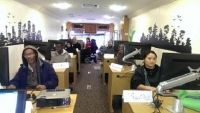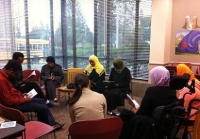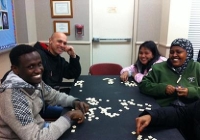Collaborative & Responsive Service for Refugees
King County Library System, Wash.
Innovation Synopsis
Combining outreach and in-library programming, a collaboration of librarian and technical staff worked in partnership with local refugee service organizations to develop and deliver appropriate and responsive services for new arrivals desperately in need of language, technology, and job training.
Challenge/Opportunity
The cities of Tukwila and SeaTac represent the gateway to the United States for hundreds of refugees and immigrants from all over the world. A New York Times article reported that there are over 80 languages spoken in the Tukwila School District, and about 70% of the district’s students are learning English. The school district is doing a great job addressing these students’ needs, but their parents and relatives face a greater challenge. Many of these new arrivals have never attended school or used a computer, yet there is only enough relief support to provide housing for their first six months. The demand for skill development and employment is intense, exacerbated by fresh physical and psychological wounds inflicted by years of being in limbo in refugee camps. The current populations are Somali, Burmese, and Bhutanese, though new groups continue to arrive. The immediate demand is for language, technology, and job skills. Specialized refugee service organizations such as Refugee Women’s Alliance (ReWA) and the International Rescue Committee (IRC) provide crucial resources but are lacking the resources to provide focused skill training.
Key Elements of Innovation
Librarian and technical staff partner with local agencies to take advantage of each group’s unique strength. Specialized social services organizations identify new arrivals and start connecting them to resources while the Library builds on traditional services to provide literacy, job, and technology training. Through conversations with service providers, our Librarian and PC Trainer developed a consistent, on-going schedule of classes and activities off-site and in the library. Librarian and technical staff specialties are leveraged to provide a multi-faceted experience. While the PC Trainer teaches basic to advanced computer skills, the Librarian teaches how to apply those skills. The Adult Services Librarian provides job searching workshops while promoting literacy, developing library discovery activities including tours and an ESL book club, with ABE books purchased in partnership with the city. The Librarian uses our Library 2 Go! bookmobile to bring reading material to the community agencies, and the Children’s Services Librarian teaches beginning students about basic English literacy activities that impact the students’ own skills and fosters an environment of literacy at home. Basic English literacy activities presented off-site and in the library promote new attendance at story times, which has supported the development of Somali-language story times and a Book Buddies program that pairs teen volunteers with beginning readers, adult or child, for an opportunity to practice reading aloud. Outreach complemented by in-library programming, with appropriate use of technology. We utilize the Techlab, an eight-workstation mobile computer lab, and deploy a kit of seven MacBooks to provide skills sessions at our partnering agencies, and we host literacy and resource sessions in the library as appropriate.
Achieved Outcomes
Since March 2013, we have had 73 sessions, serving nearly 1,013 new arrivals. The Techlab had been providing standard computer classes prior to this initiative, and as a result of the collaboration, class attendance increased from 74 in 2012 to 358 in 2013. When we first began visiting ReWA, we thought we were starting from the most basic level, but our initial menu of classes turned out to be far too advanced for these students. We had to quickly adjust our format, developing more responsive skill building experiences in a facilitated learning environment. Using a basic keyboarding program we were able to help students build two critical literacy skills for living in the United States: computing and English. Typing drills familiarize students with the fundamentals of the English language as they learn basic computing and keyboarding skills. As students gain confidence in both typing and English they begin to apply those skills in other ways, such as using Google Maps to find transportation routes, using email, using Microsoft Word to write their own life stories, and eventually creating resumes and looking for work. Consistent service has been a big driver in our success. By visiting ReWA every week, the library becomes an integral part of ReWA's curriculum and we reinforce the range of services we can offer students both offsite and in the library. Additionally, regular student visits to the library ease an otherwise intimidating or overwhelming experience.



